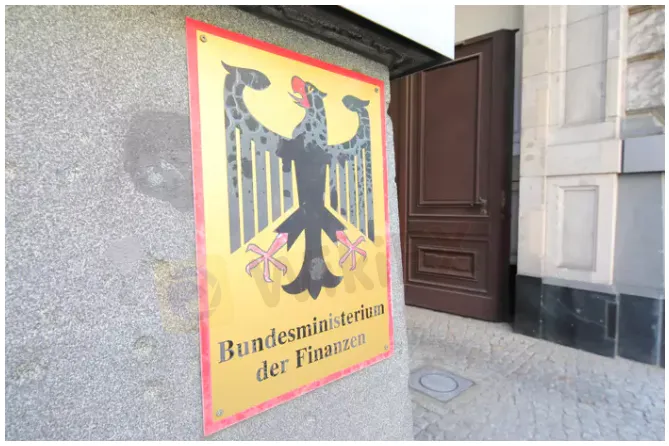简体中文
繁體中文
English
Pусский
日本語
ภาษาไทย
Tiếng Việt
Bahasa Indonesia
Español
हिन्दी
Filippiiniläinen
Français
Deutsch
Português
Türkçe
한국어
العربية
German Federal Ministry of Finance Issues Nationwide Crypto Tax Guide
Abstract:The German finance ministry has issued procedures around the income tax treatment of crypto mining, staking, lending, hard forks, and airdrops.

Key Insights:
The federal finance ministry of Germany has laid down crypto tax guidelines.
German individuals can now sell bitcoin (BTC) or ether (ETH) tax-free after one year of holding.
The guidelines also deal with tax issues around crypto-centric activities like mining, staking, lending, hard forks, and airdrops.
Amid rising uncertainty around cryptocurrencies worldwide, as the global crypto market cap came crashing down to the $1.2 trillion mark, certain positive narratives continue to steer the crypto verses boat.
The federal finance ministry of Germany has issued guidance on the income tax treatment of crypto.
Germany established crypto tax guidelines
The German finance ministrys letter is the first nationwide instruction on the topic, confirming that staked or lent cryptocurrencies are still tax-free if held for over one year.
Additionally, Parliamentary State Secretary Katja Hessel said in a statement that individuals could sell bitcoin (BTC) or ether (ETH) tax-free after one year of holding. This guidance deals with issues like mining, staking, lending, hard forks, and airdrops.
The statement also talks about the tax treatment of buying and selling bitcoin and ether. The guide further states that the one-year period applies even to cryptocurrency that has been lent out or used by someone else as a stake to create new Ethereum blocks.
Additionally, Hessel ruled out applying the alternative ten-year holding period to cryptocurrencies to qualify for tax exemptions that apply to non-mobile assets like land.
According to the guide, income tax doesnt apply when redeeming utility tokens, the crypto assets that give a particular right, such as access to a network or to receive a specific product.
The finance ministry has referred to a 2018 court judgment concerning bearer bonds to say redeeming the tokens doesnt count as a sale under income tax law.
Fast-tracking crypto adoption?
On Jan. 1, 2022, Germany brought in a new law that aimed to encourage German banks to offer crypto services. The law required any business offering crypto services in Germany to seek a license from BaFin, Germanys Federal Financial Supervisory Authority.
Since then, considerable growth has been noted in the number of traditional finance institutions offering crypto services in Germany.
Earlier this year, Germanys Commerzbank (CBK) applied for a crypto license, making Commerzbank the first major bank in Germany to move towards crypto adoption.
As reported earlier today, Commerzbanks net profit in the first quarter increased by 124%, despite increased provisions and writedowns as a result of the Russia-Ukraine conflict.

Disclaimer:
The views in this article only represent the author's personal views, and do not constitute investment advice on this platform. This platform does not guarantee the accuracy, completeness and timeliness of the information in the article, and will not be liable for any loss caused by the use of or reliance on the information in the article.
Read more

Forex Hedging: Is It a Trader’s Safety Net or Just an Illusion?
In the volatile world of forex trading, risk is inevitable. One widely used strategy is forex hedging, which is a useful technique designed not to eliminate risk entirely, but to reduce its potential impact. As global economic uncertainty persists, understanding how hedging works could be an essential addition to a trader’s toolkit.

Thinking of Investing? Read Must-Know Facts About Funding pips!
When you check the internet for Funding Pips, you'd be surprised to know it's filled with praise for Funding Pips but often lacks the real facts that traders need. Everything that seems too good to be true should always be verified first. It could be Fraud . So, we conducted research and collected several facts you must know about Funding Pips.

OctaFX Back in News: ED Attaches Assets Worth INR 134 Cr in Forex Scam Case
The Enforcement Directorate (ED) in Mumbai has attached assets worth around INR 131.45 crore. This included a luxury yacht and residential properties in Spain. Read this interesting story.

Oil Prices Stay Firm on Solid US Jobs Data
Oil prices stayed firm this week as the US labour department posted a better-than-expected payroll data in June 2025. Read this news in detail.
WikiFX Broker
Latest News
CFD Brokers Face Dual Compliance Pressures Ahead of 2026: Australia and EU Tighten Rules
Services Surveys Signal 'Expansion' In June, Inflation Fears Remain High
Major Risks Associated with AuxiliumFX: You Need to Know
ASIC cancels AFS licences of Ipraxis and Downunder Insurance Services
CFI Financial Group Becomes Official Online Trading Partner of Etihad Arena
FxPro to Launch Crypto Trading Desk, Deepening Digital Asset Push
Global Brokers Vs. Indian Rules: Why They Struggle in India
Discover 5 Benefits of Trading with Trive FX Broker
Indian regulator bars U.S. firm Jane Street from accessing securities market, impounds $566 million in manipulation probe
Asia-Pacific markets trade mixed ahead of Trump's deadline for higher tariffs
Currency Calculator


